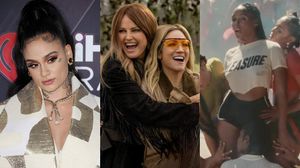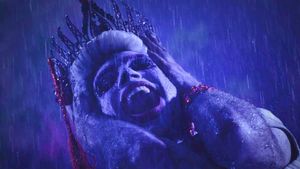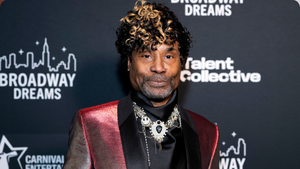During a time when reaching out to talk to anyone other than in person or via email involved a landline with a dial tone, psychic hotline queen Miss Cleo came across peoples’ late night TV screens and into their ears with a Jamaican accent and a reassuring “I’ll tell you what’s going on with you” strength that millions dialed in to hear (and if not her, then many others who worked for the same popular hotline). After becoming a cult figure of the 1990s, Miss Cleo had a reemergence in the mid-Aughts after she came out as a lesbian. Both revered, reviled, and investigated by the Federal Trade Commission, the complicated person behind the persona — Los Angeles-born Youree Dell Harris — is explored in the recent HBO Max documentaryCall Me Miss Cleo. The film, co-directed by Celia Aniskovich, shows that Harris was much more than a campy late night fixture. We spoke to Aniskovich about Harris, a woman who sadly passed away from cancer in 2016 at only 53 years old.
I have to start with the most obvious question. So why a movie about Miss Cleo?
So, I, like so many people, grew up seeing Miss Cleo on TV and her ubiquitous “Call Me Now” phrase. And as a filmmaker, I'm always particular interested in stories that for whatever reason may have been lost or forgotten to history. And when I started thinking about Cleo, the first thing that struck me was here was this person that so many people knew and loved; so many people had included as part of their collective memory. Yet we knew so little about the real person behind the moniker. And that for me is always a fascinating place to start because when that happens, that usually means there’s a lot more to the story. I started digging in and found, yes, in fact, there was much more to the woman behind the Miss Cleo brand than I knew.
What was that process like? What did you find as you did the digging in?
I think one of the first things that's important to say that you see in our film is that Cleo was maligned by the media regularly. I mean, Cleo was the butt of a lot of jokes, and she took it really to heart — she went into seclusion. She really struggled with the way in which people portrayed her, the way in which people dismissed her and made her seem as if she was the mastermind behind this whole fraudulent scheme.
So a big part of the process was getting close friends and family to trust me and to believe that I wasn't going to do the same thing all over again, but equally know that I wasn't just going to sort of gloss over all of the complicated things about Cleo. It was really an incredible process of getting people to trust and understand what we were trying to do.
But I also just am so grateful for her friends and family for not just being willing but encouraging about the idea of presenting not the perfect version of Cleo, but the real version of Cleo, the multifaceted, multidimensional Cleo that everyone had come to know. And depending on when you knew Cleo, you knew a different person, which is a part of her story. Honestly, [it’s] a part of all of our stories, you know, we grow, we change. We are not our best day. We’re not our worst day.
Call Me Miss Cleo | Official Trailer | HBO Maxyoutu.be
In putting this together, what was a true thing you learned that surprised you?
I think Cleo had some real gifts, I really do. I’m not sure what I believe about the practices of…call it what you want, voodoo mysticism, tarot, reading, [but] I heard some incredible stories that I can't explain away. And we also had some really interesting things happen while making the film with things falling off of walls for no reason during the middle of filming; just sort of strange coincidences.
I expected going into this that, yes, there would be a woman underneath the brand. I expected to understand that there would be a complicated, multifaceted person. I'm not sure I expected that I'd come out of it believing a little more in what Cleo brought to the world. Because I do think that's an important thing about Cleo. Whether or not you believe what she was doing was real, Cleo believed that what she was doing was real.
And I think too, you know, people forget that there were tons of TV psychics, right? Like Cleo wasn't an anomaly, but Cleo's the one we remember. And I think in part because of, you know, a lot of the stories we talk about in the film. But she connected to people. People wanted to talk to her. They didn't just want to talk to anyone.
And, you know, the thing I said about Cleo really believing [in psychic powers] is something that really came out when talking to her godson, who is the reason she came out in The Advocate.
You know, he's also sort of a professional skeptic more than anyone else in the family; he’s not sure that he believes all the same things she did. But he could see that she believed that deeply. And I think Cleo had a way with people — you see it in the film. There's almost no one I could find who disliked Cleo. I mean, just everyone found something [even] the FTC adjuster who investigated her, loved her.
What about something that you hoped for? What was something that you hoped to find in depth?
Cleo was a cool person. I hoped that we would find a new legacy for Cleo, and I hope that we succeeded in that — I think we did. I hoped that she wouldn't be the one-dimensional person that the news pundits had made her out to be. I hoped that there was more to her professional story, more to her personal story, and there was; this was one of the greatest joys of making this film for me.
I hoped that Cleo's life could give other people something to relate to. I hoped that people would find themselves in Cleo and the thing that I found over and over was people finding themselves in Cleo, whether it was because here was another Black woman, here was another queer woman, here was another woman, here was someone who had been labeled as something she wasn't, here was someone who had been taken advantage of. It felt like no matter who you were, you could find something that you related to in Cleo. And I think in finding yourself in someone's story, you're then able to humanize them more; we're able to see people that we see ourselves in as more human.
How did you end up getting it greenlit?
Luckily, this process was quite a bit easier than sometimes it is. I had incredible partners in Gunpowder and Sky and HBO Max; Gunpowder and Sky has a sort of first-look situation with HBO Max. We had been talking about what could we do with them, what projects, and there was this conversation about Beanie Mania, a film that came out about a year before Cleo on HBO Max that I produced. I don't need to tell anyone, because we've seen it on TV, but this sort of nostalgia space is one that's ripe right now. So there was this conversation and immediately Miss Cleo came to mind. We did a lot of development — is there a story there? Who are the people that would tell that story? Is anyone willing to tell that story? Additionally, Cleo did not do a lot of interviews. Archives exist; I wanted to make sure that if we were going to retell her story with Cleo not being alive, she was going to be able to be part of the retelling of that story in some way.
It's why we use so much of the interview she did with Hotline before she passed away. I have to say again, my partners in this were so supportive and wonderful of really going on the ride because it was a ride, any film is a ride. But this one in particular, we went in not always sure what we were going to come out with, and HBO Max championed this film from day one when the merger [with Discover] happened in the middle of us making this, which, you know, a lot of filmmakers can tell you was and still is a difficult time. HBO Max continued to champion this film, continued to make sure that this film got to the air.
But also, we have two incredible celebrity interviews in the film, Debra Wilson and Raven-Symoné and I'd be remiss not to acknowledge how much they were along for the ride. I said to them, part of the experience of interviewing about Cleo is going to be the experience. And I'd like to just kind of go in blind with you, if that's okay. And they said “yes.” They said, “sure,” which was amazing.
How are people responding to the final project?
We made a film about gender, about spirituality, about race, about identity. You know, we picked all of the hot-button, difficult issues. So we also knew going in people were going to have strong positive and negative opinions. But what our hope was in making this film was that people would have some questions answered; more importantly, they would leave the theater or their couch or, where they watched it, with even more questions that they'd leave, you know, looking at their spouse or their sister or their friend and saying, “Well, I don't think this I think…” and start a larger conversation, because the thing that in talking to close friends and family really struck me was that Cleo was never a conversation. She was the butt of a joke, she was a tagline, but we never gave her the grace of nuance, of conversation, of contemplation. So my goal was never to tell you whether to love Cleo or hate Cleo. That was not the point, I was not trying to convince you one way or another of Cleo. But it's been remarkable to see people re-meeting Cleo almost as if this is a new person they're getting to know, and also to see a younger generation who’s never heard of Cleo, who doesn't know what a hotline is, who barely knows what an infomercial is.




































































Charlie Kirk DID say stoning gay people was the 'perfect law' — and these other heinous quotes